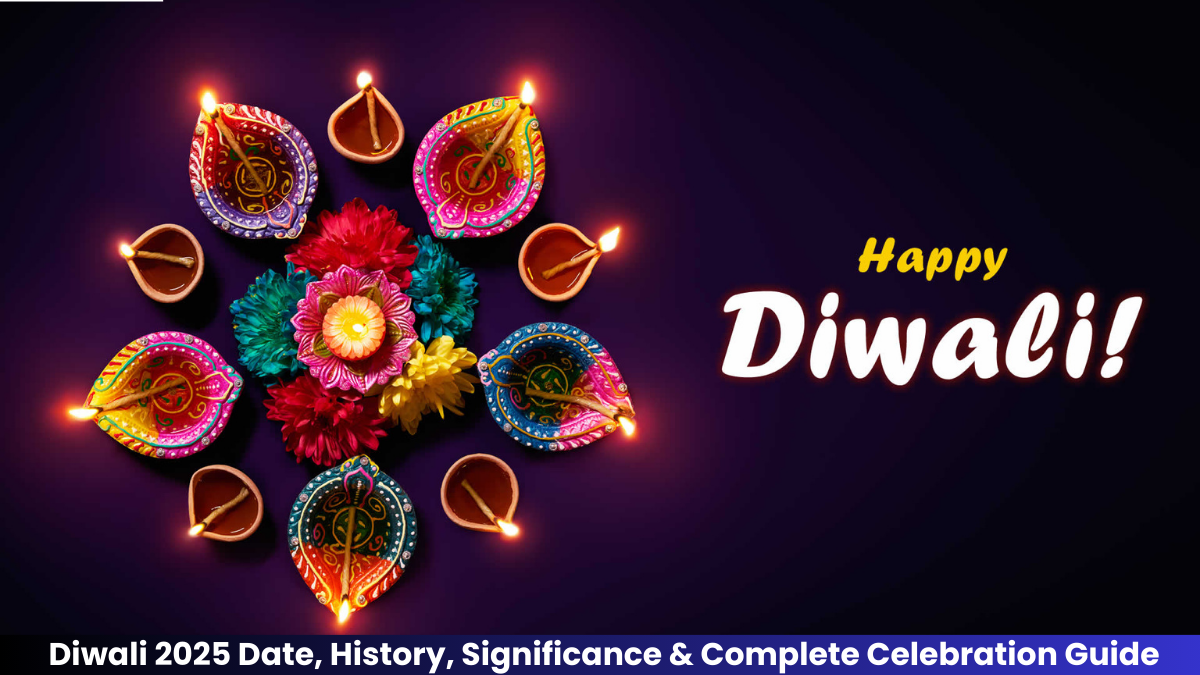Introduction
Diwali, or Deepavali, is one of the most widely celebrated festivals in India and among Hindu communities worldwide. In 2025, Diwali will be observed from October 18 to October 22, with the main day of Lakshmi Puja on October 20. The festival symbolizes the victory of light over darkness, knowledge over ignorance, and good over evil. It is a time when families come together to clean and decorate their homes, perform sacred rituals, exchange gifts, prepare traditional sweets, and celebrate with fireworks.
Beyond its religious significance, Diwali fosters social bonds, generosity, and a sense of renewal, as people illuminate their surroundings with diyas and candles. This guide explores the history, customs, eco-friendly practices, and global celebrations of Diwali 2025, helping you understand its rich cultural and spiritual significance while planning meaningful celebrations.
Understanding Diwali: Significance and Traditions
Diwali’s origins trace back to multiple Hindu legends, most notably the return of Lord Rama to Ayodhya after defeating the demon king Ravana. To welcome him, citizens lit oil lamps along the streets and homes, symbolizing the triumph of light over darkness. Over centuries, the festival evolved into a multi-day celebration, observed with regional variations across India. Diwali is not only a religious festival but also a cultural celebration of prosperity, family, and community.
Key Days of Diwali 2025
-
Dhanteras (October 18):
The festival begins with Dhanteras, a day dedicated to health and prosperity. Traditionally, families clean their homes and purchase precious metals, utensils, or coins as symbols of wealth and good fortune. -
Choti Diwali / Naraka Chaturdashi (October 19):
This day commemorates Lord Krishna’s victory over the demon Narakasura. Devotees perform early morning rituals, light small lamps, and prepare for the main Diwali celebrations. -
Lakshmi Puja (October 20):
The main day of Diwali is devoted to Goddess Lakshmi, the goddess of wealth. Homes are illuminated with rows of diyas, rangoli designs adorn entrances, and families perform Lakshmi Puja in the evening, seeking prosperity and blessings. -
Govardhan Puja (October 21):
Celebrated in honor of Lord Krishna, this day symbolizes protection and devotion. Devotees prepare a mountain of food offerings, known as “Govardhan,” representing abundance and gratitude. -
Bhai Dooj (October 22):
The festival concludes with Bhai Dooj, celebrating the bond between brothers and sisters. Sisters perform aarti for their brothers and pray for their well-being, while brothers give gifts as a token of love and protection.
Celebrating Diwali: Customs and Rituals
1. Home Decoration
Cleaning and decorating the home is a central part of Diwali. It is believed that Goddess Lakshmi visits clean, well-lit homes. Families create colorful rangoli patterns at doorways, light oil lamps or candles, and place flowers to welcome prosperity.
2. Performing Pujas
Lakshmi Puja involves offering sweets, fruits, and flowers while reciting prayers. Families gather for the evening rituals, invoking blessings of wealth, happiness, and spiritual harmony.
3. Gift Exchange
Exchanging gifts is an expression of goodwill. Traditional gifts include sweets, dry fruits, and decorative items. In recent years, eco-friendly gifts like plants or handmade items are becoming popular, emphasizing sustainability.
4. Festive Foods
Food plays a major role in Diwali celebrations. Households prepare an array of sweets such as laddoos, barfis, and pedas, along with savory snacks like samosas and chaklis. Sharing meals strengthens bonds with family and neighbors.
5. Fireworks and Celebrations
Lighting fireworks is a long-standing tradition, symbolizing joy and the dispelling of darkness. However, there is a growing awareness of pollution and noise, leading to alternative celebrations such as community shows or using sparklers responsibly.
Eco-Friendly Diwali Practices
Sustainability is increasingly becoming part of Diwali celebrations. Families are adopting LED lights instead of oil lamps, biodegradable rangoli colors, and reducing firecracker usage. Many people prefer gifting plants or eco-friendly products. Celebrating Diwali responsibly ensures that the festival’s essence—spreading light, joy, and prosperity—remains unharmed while protecting the environment for future generations.
Diwali Across the Globe
Diwali is celebrated not only in India but also in countries with significant Indian populations, including the United States, the United Kingdom, Canada, Singapore, and Australia. International celebrations include cultural programs, community prayers, and public Diwali events. Some countries have recognized Diwali as an official holiday, reflecting its growing cultural significance worldwide. This global reach strengthens cultural ties and allows people from different backgrounds to experience and appreciate the festival’s beauty.
Read More: Troozer.com Review: What It Is, What to Watch Out For & Is It Safe?
Conclusion
Diwali 2025 is a celebration of light, hope, and the enduring triumph of good over evil. It is a festival that unites families, strengthens communities, and encourages reflection, generosity, and gratitude. Whether celebrated with grandeur or simplicity, Diwali offers an opportunity to embrace tradition, practice mindfulness, and adopt eco-friendly habits that protect the environment while preserving the festival’s spiritual essence.
By honoring rituals, preparing traditional foods, exchanging gifts, and spreading joy, Diwali continues to be a cherished celebration that transcends borders, inspiring people to cultivate positivity and illuminate their lives with knowledge, love, and prosperity. The Festival of Lights reminds us all that even in challenging times, light, hope, and goodness will always prevail.
FAQs:
-
When is Diwali 2025?
Diwali 2025 begins on October 18 with Dhanteras and the main day of Lakshmi Puja falls on October 20. -
What are the key rituals of Diwali?
Key rituals include home cleaning and decoration, performing Lakshmi Puja, lighting diyas, exchanging gifts, and preparing traditional sweets. -
How can I celebrate an eco-friendly Diwali?
Use LED lights, avoid firecrackers, opt for biodegradable decorations, and gift plants or sustainable products. -
Is Diwali celebrated outside India?
Yes, Diwali is celebrated globally, including in the USA, UK, Canada, Australia, and Singapore, often with public events and cultural programs. -
What is the significance of Lakshmi Puja?
Lakshmi Puja is dedicated to Goddess Lakshmi, the goddess of wealth, and is believed to bring prosperity, happiness, and blessings to households.

